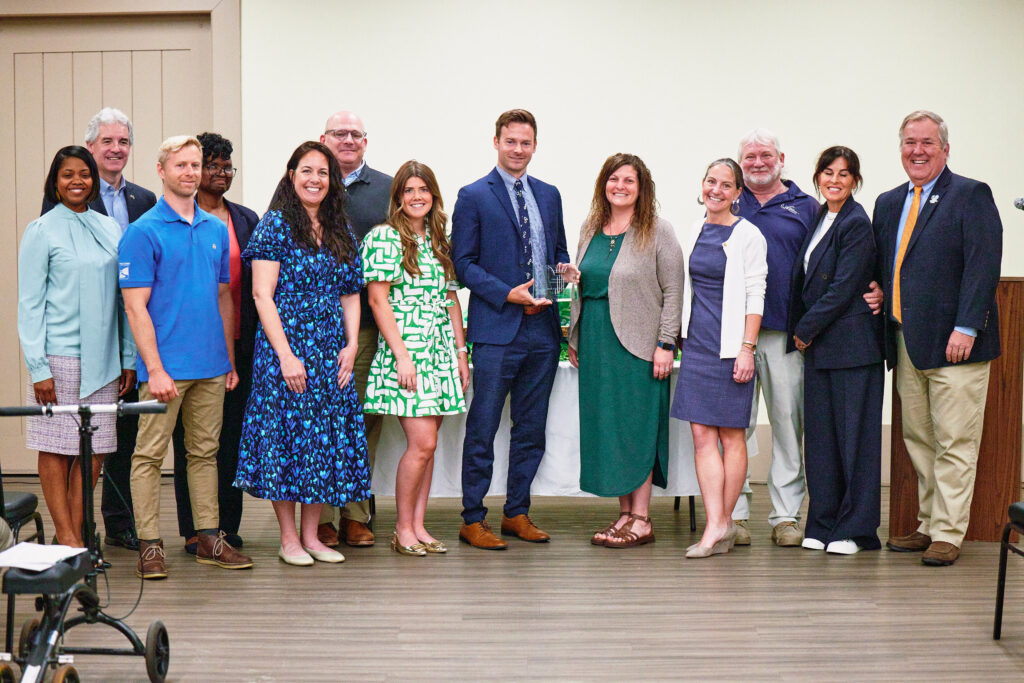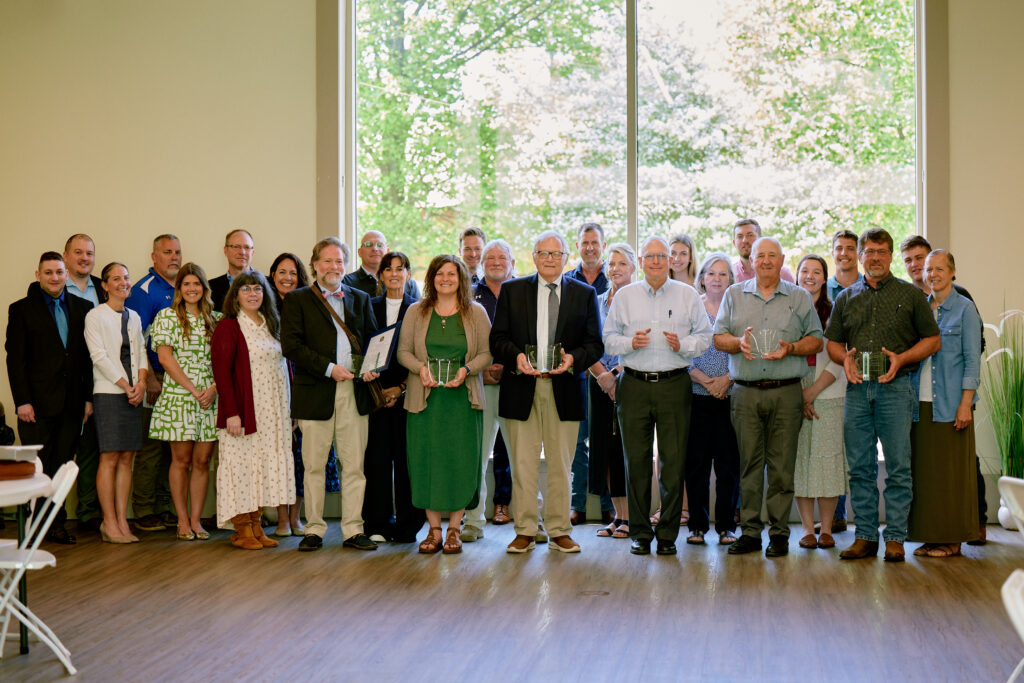
FOR IMMEDIATE RELEASE
2024 Governor’s Agricultural and Urban Conservation Award winners honored today
DOVER (April 30, 2024) – A ceremony marked the annual Governor’s Agricultural and Urban Conservation Awards today. DNREC Secretary Shawn Garvin, Delaware Association of Conservation Districts President Gwen Pierce, and USDA-Natural Resources Conservation Service State Conservationist Jena Moore, led a ceremony recognizing this year’s honorees and signed a proclamation officially designating April 28 – May 5 as Stewardship Week in Delaware under the theme, “May the Forest be with you, Always.”

designating April 28 – May 5 as Stewardship Week
“Stewardship Week helps to remind us all of the power each person has to conserve natural resources and improve our world.” said Pierce, “The Stewardship concept involves personal and social responsibility, including a duty to learn about and improve natural resources as we use them wisely, leaving a rich legacy for future generations.”

“Conservation is a collective effort” said Pierce. “Forests are a vital part of our working lands, and the collective efforts from our cooperators and our organizations join together to protect the natural resources that we rely on and use every day.”
This year’s agricultural honorees include Thompson Farms, a Kent County farm dedicated to conservation on their grain and poultry operation, Richard Swartzentruber, a Sussex County organic farmer passionate about sustainable agriculture practices and giving back, and Rick Mickowski, a longtime New Castle Conservation District staff member who has focused on protecting the environment as they provide services that build up the local community.
Urban conservation award recipients demonstrate innovation and exceptional community service. Robert Palmer, P.E., Beacon Engineering’s design showcases an innovative approach to stormwater management using a hybrid Submerged Gravel and Ephemeral Wetland facility. In Sussex County, Carl M. Freeman Companies and theTower Hill Community was recognized for being an example of thoughtful and purposeful conservation; Their project will become a model for other communities in Sussex County and the state.. New Castle County recognizes the Brandywine Falls Roadway Stabilization Project for Improving the management of stormwater runoff and eliminating erosion of the steep slopes that ultimately flow into the Brandywine River which is the primary source of drinking water for the City of Wilmington.
“Today’s recipients work with Delaware’s conservation partners to implement innovative and comprehensive conservation practices on their farms and in their businesses and projects.” said Pierce. “Delaware is fortunate to have a wonderful partnership between Delaware’s conservation districts, DNREC and NRCS, who provide invaluable support to our cooperators. These awards highlight the beneficial outcomes of these relationships, and we’d like to take a moment to recognize the hard work that’s been done.”
Senator Nicole Poore was recognized as DACD’s Legislator of the Year. Senator Poore has consistently supported Conservation Districts, tax ditch organizations and agriculture best practices during her 12-years in the Senate. She and her fellow Bond Committee members approved increases in funding for the conservation cost share program, Resource Conservation and Development program, supplemental tax ditch assistance, and an enhanced cover crop cost-share program under the Delaware Nutrient Management Commission.
Senator Poore is an advocate for the needs of her constituents; she has contributed CTF funding for 69 RC&D projects during her Senate tenure. These projects range in size from small, individual back-yard drainage improvement projects to projects with six-figure price tags. She always drives a hard bargain on behalf of her constituents and never settles for anything less than your best efforts and most cost-effective, creative project recommendations. 
Delaware’s Conservation Districts, one in each county, are a unique governmental unit in partnership with DNREC. Their mission is to provide technical and financial assistance to help Delawareans conserve and improve their local natural resources, including solving land, water and related resource problems; developing conservation programs to solve them; enlisting and coordinating help from public and private sources to accomplish these goals; and increasing awareness of the inter-relationship between human activities and the natural environment. Delaware’s district supervisors have a statewide organization, the Delaware Association of Conservation Districts (DACD), a voluntary, non-profit alliance that provides a forum for discussion and coordination among the Conservation Districts.
Additional details for this year’s Conservation Award winners:
New Castle County
Agricultural: Rick Mickowski
Rick Mickowski began his career in conservation, June of 1975. After graduating from William Penn High School, Rick joined a summer youth conservation program in Lewden Greene park where he spent 5 summers with the youth conservation program throughout New Castle County parks. Rick graduated from Abilene Christian University in 1979 with a B.S. in Agronomy and a Minor in Range Management. Rick took a position with NCCD in 1980 where he focused on the tax ditch program and drainage investigations. In 1986 Rick’s role expanded to include educational outreach. Rick has been involved with many professional organizations over the years and has received multiple awards and recognitions for his contributions to conservation and to the community.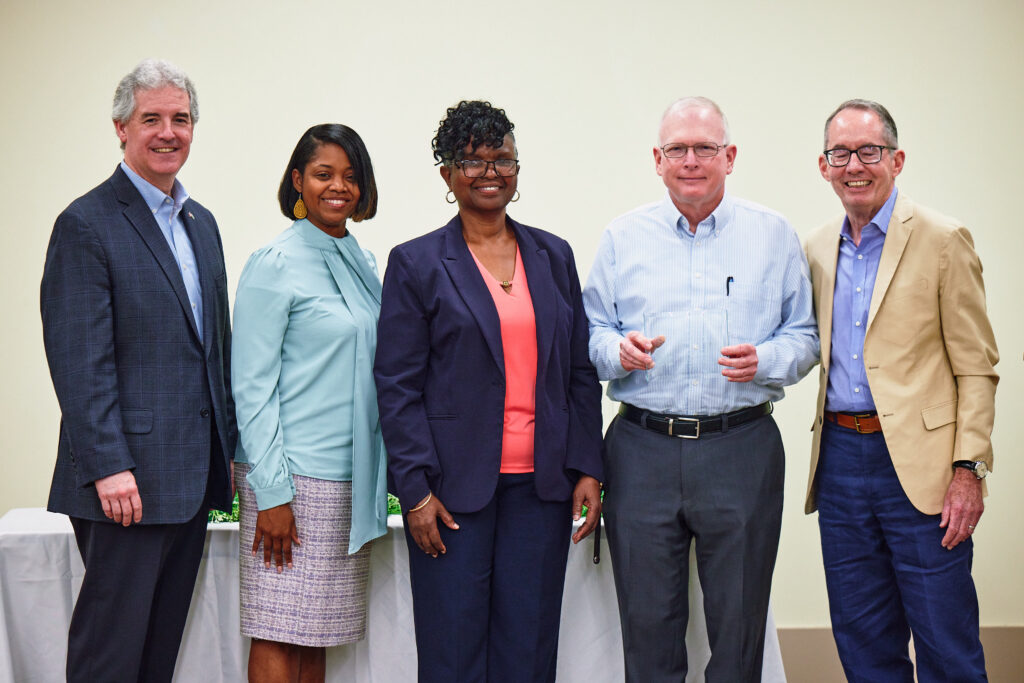
URBAN: Brandywine Falls Roadway Stabilization Project
Stormwater runoff had damaged the retaining wall that stabilizes Brandywine Falls Road which is the only access into the community. The work site had limited access for the contractor and the work area was tight making the project logistics critical to the success of the project. Due to the limited area of disturbance, there was minimal stockpiling of materials on the project. The precast culvert, stone, and borrow were placed as they arrived at the site. In addition, the contractor removed the retaining wall and excavated materials in trucks as the materials were excavated, so contaminated run-off and erosion from the site was minimized.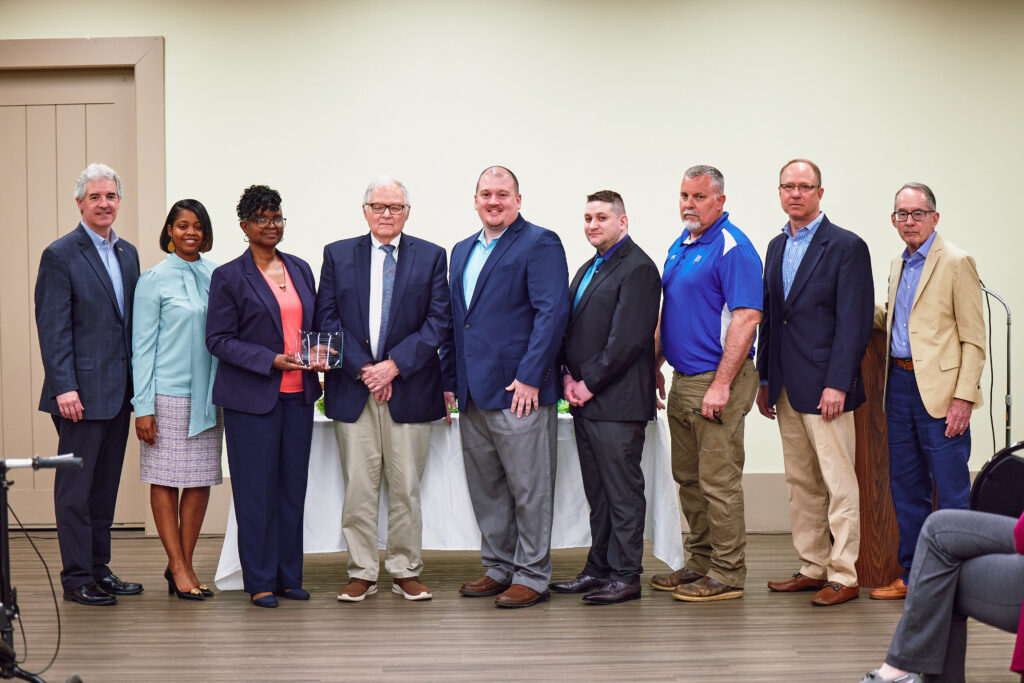
Kent County
AGRICULTURAL: Thompson Farm LLC
Thompson Farm LLC started as a mixed livestock/crop production farm in the early 1900s. They have had many operations over the years, including dairy, poultry, and crop production. Today, they are more focused on grain crops and poultry, as well as the repair and restoration of farm machinery. Thompson Farm LLC also applies no-till practices to some of their fields and have participated in soil health challenges such as the “Soil Your Undies” campaign. They also pride themselves on having a close relationship with local and out-of-state farmers and having a positive effect on the local economy. In 2016 they were presented with the Delaware Century Farm award.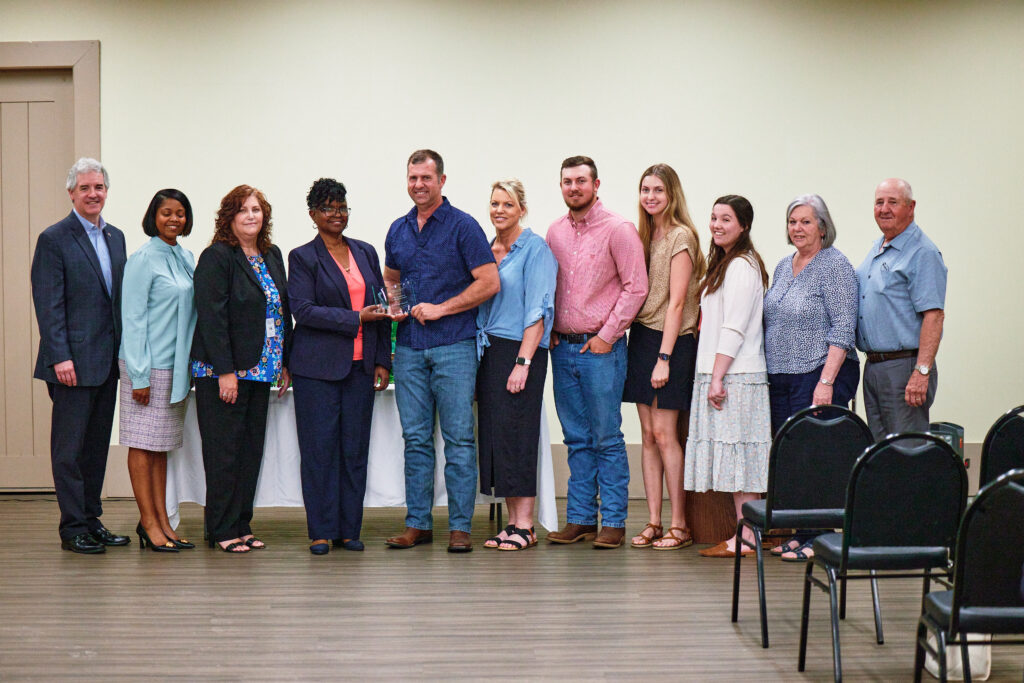
URBAN: Robert Palmer, P.E., Beacon Engineering
The Chicks Warehouse Expansion project will be located in Harrington, Delaware and was designed by Robert Palmer, P.E. with Beacon Engineering. Mr. Palmer’s expertise was pivotal in addressing challenging site constraints, including poor soil conditions, location within the Kent County Groundwater Recharge Zone and the Jackson’s Tax Ditch.
Due to the location within the groundwater recharge zone, the project could not utilize a typical approach to stormwater management and had to consider only practices that provided a hydrogeological benefit. Mr. Palmer’s multifaceted design utilizes a Submerged Gravel Wetland that overflows into an Ephemeral Wetland that eventually discharges into the Jackson’s Tax Ditch. The Submerged Gravel Wetlands (SGW) treat stormwater runoff primarily through filtration, sedimentation, physical and chemical sorption, microbially mediated transformation, uptake, and attenuation. The Ephemeral Wetland plays an important role in maintaining water quality, controlling erosion, and providing a unique habitat that supports a diverse array of plant and animal species. This environmentally conscious design not only surpasses industry standards but also stands as a testament to Mr. Palmer’s commitment to environmental conservation and engineering excellence.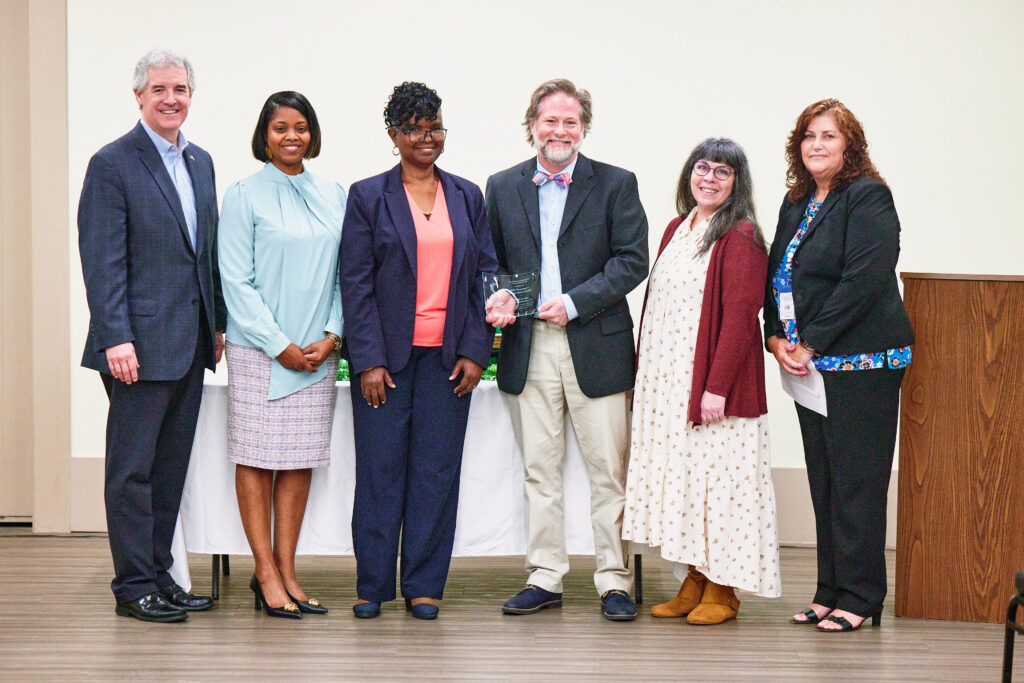
sussex county
AGRICULTURAL: Richard Swartzentruber- Swartzentruber Homestead
Richard Swartzentruber, of Greenwood, is a humble fourth-generation farmer with an unwavering commitment to giving back. The farm, Swartzentruber Homestead, has been in the family for over 105 years. Located just over a mile as the crow flies from the Kent/Sussex County line, in the Chesapeake Bay watershed, the operation covers almost 200 acres of cropland, with 60,000 organic broilers and 50 Wye Angus beef cattle that graze on organic pastures.
As an organic farmer, Swartzentruber must be proactive in his operational management, with boots on the ground scouting and anticipating crop, soil and animal needs. Without the same tools as his peers, synthetic fertilizers or pesticides, he finds creative ways to manage his operation, like grazing cattle on cover crops planted in woods or utilizing the weed zapper, a 10,000 volt tractor mounted generator to kill weeds growing over a crop canopy.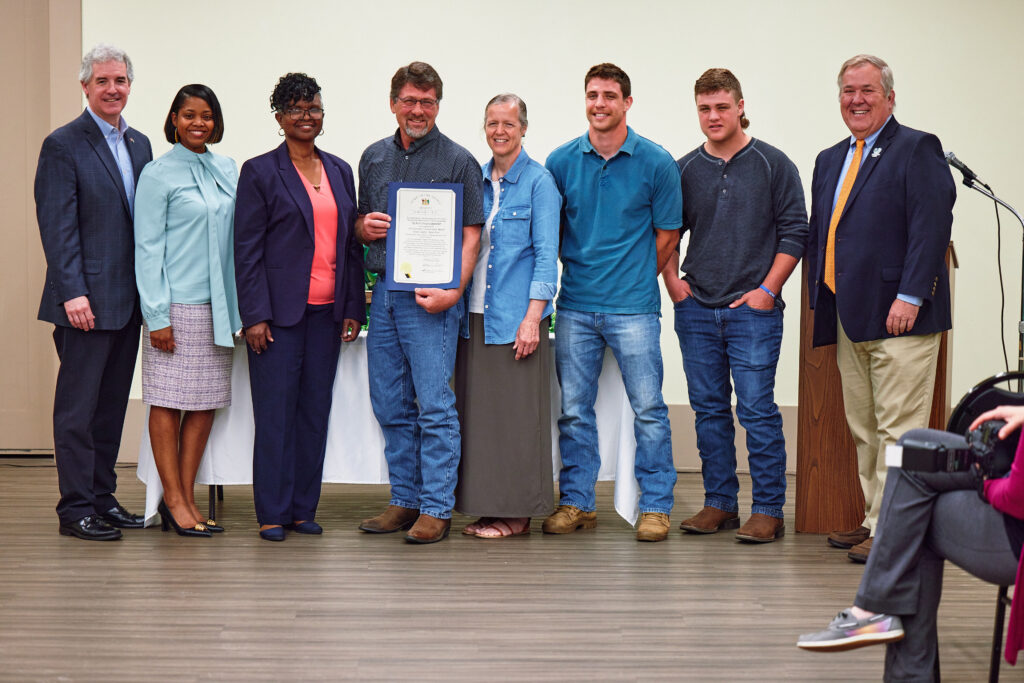
URBAN: Carl M. Freeman Companies- Tower Hill Community
Situated along New Road, just under two miles from Historic Lewes, the Tower Hill community consists of 292 single-family homes covering approximately 135 acres in the Delaware Bay watershed. The stormwater management at Tower Hill includes 13 wet ponds, two dry basins, approximately 60 acres of open space, and nine acres of woodlands. This community is unique because it is the first of this scale in Sussex County, to begin meadow installation and seeding during the site construction phase. Carl M. Freeman Companies anticipates seeding nearly 30 acres of native wildflowers and grasses, amounting to nearly half of the entire open space within the community.
Carl. M. Freeman Companies recognizes the benefits of native plants compared to turfgrass and are committed to changing open-space design, starting with Tower Hill. The project was a statewide collaboration with the Sussex Conservation District and the University of Delaware.